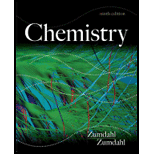
(a)
Interpretation: The given terms are to be defined and questions based upon
Concept introduction: The term polymer means many units or parts. Polymers are very large molecules having high molecular masses, hence are also called as macromolecules.
The two main types of polymers are thermosetting polymer and thermoset polymer.
(b)
Interpretation: The given terms are to be defined and questions based upon polymers are to be answered.
Concept introduction: The term polymer means many units or parts. Polymers are very large molecules having high molecular masses, hence are also called as macromolecules.
The two main types of polymers are thermosetting polymer and thermoset polymer.
To determine: The definition of
(c)
Interpretation: The given terms are to be defined and questions based upon polymers are to be answered.
Concept introduction: The term polymer means many units or parts. Polymers are very large molecules having high molecular masses, hence are also called as macromolecules.
The two main types of polymers are thermosetting polymer and thermoset polymer.
(d)
Interpretation: The given terms are to be defined and questions based upon polymers are to be answered.
Concept introduction: The term polymer means many units or parts. Polymers are very large molecules having high molecular masses, hence are also called as macromolecules.
The two main types of polymers are thermosetting polymer and thermoset polymer.
(e)
Interpretation: The given terms are to be defined and questions based upon polymers are to be answered.
Concept introduction: The term polymer means many units or parts. Polymers are very large molecules having high molecular masses, hence are also called as macromolecules.
The two main types of polymers are thermosetting polymer and thermoset polymer.
(f)
Interpretation: The given terms are to be defined and questions based upon polymers are to be answered.
Concept introduction: The term polymer means many units or parts. Polymers are very large molecules having high molecular masses, hence are also called as macromolecules.
The two main types of polymers are thermosetting polymer and thermoset polymer.
(II)
Interpretation: The given terms are to be defined and questions based upon polymers are to be answered.
Concept introduction: The term polymer means many units or parts. Polymers are very large molecules having high molecular masses, hence are also called as macromolecules.
The two main types of polymers are thermosetting polymer and thermoset polymer.
Trending nowThis is a popular solution!

Chapter 22 Solutions
Chemistry
- How does the square root mean square velocity of gas molecules vary with temperature? Illustrate this relationship by plotting the square root mean square velocity of N2 molecules as a function of temperature from T=100 K to T=300 K.arrow_forwardDraw product B, indicating what type of reaction occurs. F3C CF3 NH2 Me O .N. + B OMearrow_forwardBenzimidazole E. State its formula. sState the differences in the formula with other benzimidazoles.arrow_forward
- Draw product A, indicating what type of reaction occurs. F3C CN CF3 K2CO3, DMSO, H₂O2 Aarrow_forward19) Which metal is most commonly used in galvanization to protect steel structures from oxidation? Lead a. b. Tin C. Nickel d. Zinc 20) The following molecule is an example of a: R₁ R2- -N-R3 a. Secondary amine b. Secondary amide c. Tertiary amine d. Tertiary amidearrow_forwardpls helparrow_forward
- pls helparrow_forward35) Complete the following equation by drawing the line the structure of the products that are formed. Please note that in some cases more than one product is possible. You must draw all possible products to recive full marks! a. ethanol + 2-propanol + H2SO4 → b. OH conc. H2SO4 CH2 H3C CH + K2Cr2O7 C. d. H3C A pressure CH3 + H2 CH Pt catalystarrow_forward21) The rate of reaction depends upon: a. the concentration and nature of reactants b. the temperature of the reaction C. whether or not a catalyst was used d. all of the above 22) A Maxwell-Boltzmann curve shows the distribution of molecular energies in a reaction system. When the temperature in this system is increased, the peak is a. higher and further to the right. b. higher and further to the left. c. lower and further to the right. d. lower and further to the left. 23) Which of the following correctly describes the reaction represented by the reaction below? CaCO3 (s) + energy → CaO (s) + CO2 (g) a. It is exothermic and the potential energy is greater in the reactants than the products. b. c. It is exothermic and the potential energy is greater in the products than the reactants. It is endothermic and the potential energy is greater in the products than the reactants. d. It is endothermic and the potential energy is equal for the products and reactants.arrow_forward
 World of Chemistry, 3rd editionChemistryISBN:9781133109655Author:Steven S. Zumdahl, Susan L. Zumdahl, Donald J. DeCostePublisher:Brooks / Cole / Cengage Learning
World of Chemistry, 3rd editionChemistryISBN:9781133109655Author:Steven S. Zumdahl, Susan L. Zumdahl, Donald J. DeCostePublisher:Brooks / Cole / Cengage Learning Chemistry: The Molecular ScienceChemistryISBN:9781285199047Author:John W. Moore, Conrad L. StanitskiPublisher:Cengage Learning
Chemistry: The Molecular ScienceChemistryISBN:9781285199047Author:John W. Moore, Conrad L. StanitskiPublisher:Cengage Learning Chemistry: Principles and ReactionsChemistryISBN:9781305079373Author:William L. Masterton, Cecile N. HurleyPublisher:Cengage Learning
Chemistry: Principles and ReactionsChemistryISBN:9781305079373Author:William L. Masterton, Cecile N. HurleyPublisher:Cengage Learning Introductory Chemistry: A FoundationChemistryISBN:9781337399425Author:Steven S. Zumdahl, Donald J. DeCostePublisher:Cengage Learning
Introductory Chemistry: A FoundationChemistryISBN:9781337399425Author:Steven S. Zumdahl, Donald J. DeCostePublisher:Cengage Learning Principles of Modern ChemistryChemistryISBN:9781305079113Author:David W. Oxtoby, H. Pat Gillis, Laurie J. ButlerPublisher:Cengage Learning
Principles of Modern ChemistryChemistryISBN:9781305079113Author:David W. Oxtoby, H. Pat Gillis, Laurie J. ButlerPublisher:Cengage Learning Chemistry: Principles and PracticeChemistryISBN:9780534420123Author:Daniel L. Reger, Scott R. Goode, David W. Ball, Edward MercerPublisher:Cengage Learning
Chemistry: Principles and PracticeChemistryISBN:9780534420123Author:Daniel L. Reger, Scott R. Goode, David W. Ball, Edward MercerPublisher:Cengage Learning





